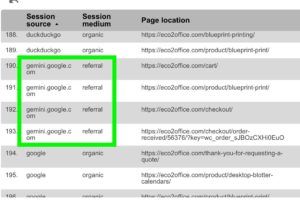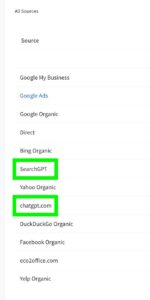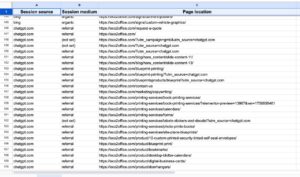AI SEO isn’t just a buzzword anymore. It’s already producing measurable traffic, leads, and sales from platforms like ChatGPT, Perplexity, and Google’s Gemini. I’m talking about customers who literally say, “I found you on ChatGPT” or “Perplexity recommended you.” This isn’t theory. We have GA4 reports, Semrush data, Form Submissions and CallRail logs to prove it.
If you still think ChatGPT is just for quick answers or student essays, you’re missing the point. These AI assistants are functioning like search engines. They’re pulling information, citing sources, and sending qualified traffic to websites. If your business isn’t appearing in those answers, you’re invisible to a growing audience.
Why AI Assistants Are the New Search Engines
AI assistants win attention because they deliver a direct, confident answer without the clutter. No wading through ads, pop-ups, or irrelevant results. Just one consolidated, citation-rich response.
The shift is happening now
- ChatGPT can browse the web and cite sources in its responses.
- Perplexity behaves like an AI-native search engine.
- Google Gemini is integrating AI answers directly into search results with linked citations. Every one of those citations is a potential traffic source. Treat it like you would Organic, Paid, or Referral in your reporting.
The Data That Proves It
We have been paying close attention to the Metrics for a while now. Here’s what the analytics show…
From GA4 and Looker Studio:
 Referral sources like `chatgpt.com`, `SearchGPT`, and `gemini.google.com` consistently appear in reports.
Referral sources like `chatgpt.com`, `SearchGPT`, and `gemini.google.com` consistently appear in reports.- Visitors from these sources are hitting high-value pages:
- Product and service pages (e.g., blueprint printing, book printing, business cards)
- Transactional pages like carts, checkouts, and order confirmation screens
- Contact and request-a-quote forms
- From CallRail:
- Calls logged with sources like SearchGPT and chatgpt.com
- Customers directly stating they found the business through AI assistants
- These aren’t casual browsers. Many are already in buying mode when they arrive.
How We Started Targeting AI SEO

When we began working with a local print shop in October 2024, their SEO presence was almost non-existent. We built their organic performance from the ground up with a dual focus on Organic SEO and Local SEO, aiming to dominate Google SERPs for their most important services.
Once we started seeing strong results there, we shifted gears. AI assistants were dominating the marketing conversation, and we knew that if they were going to be the next gatekeepers of search visibility, we needed to be there early.
The result: measurable traffic and leads coming directly from ChatGPT, Gemini, and other AI-driven platforms.
What Makes AI SEO Different From Regular SEO
Traditional SEO is about ranking in Google. AI SEO is about being the most trustworthy, complete answer to a user’s question so that the AI pulls your content into its response.
That means:
- Clear, direct answers before you dive into detail
- Structured, scannable content that models can parse easily
- Fewer wasted words and no filler
- Strategic use of schema markup to help AI assistants “understand” your content
If your page looks like a wall of text with no obvious takeaways, you’re making it harder for AI to include you.
By the way, you may even be able to appear in these AI Chatbots before being indexed in SERPs.
Our AI-Friendly Content Approach

Here’s what we’re doing that works:
- Lead with the answer: Make the main point obvious within the first few sentences.
- Use question-based headings: These match how users phrase prompts in AI assistants.
- Break content into digestible sections: Short paragraphs, bullets, and subheadings.
- Add schema markup: FAQ, product, and organization schema where relevant.
- Keep it up to date: Refresh content regularly so AI assistants see it as current and reliable.
If an answer wouldn’t hold up in a live interview or pitch meeting, it’s probably not ready for AI SEO.
Real Example: Conversions From AI Traffic
After we optimised for AI assistant visibility:
- GA4 showed dozens of visits per week from chatgpt.com and gemini.google.com.
- High-value pages like checkout and quote request forms were common landing pages.
- CallRail captured calls tied directly to AI referrals.
- One customer even placed an order after ChatGPT recommended the business for blueprint printing.
This wasn’t curiosity clicks. These were direct business opportunities.
AI Assistants in the Funnel
We initially assumed AI referrals would be mostly research-stage (top-of-funnel). The data says otherwise.
Top-of-Funnel:
People asking broad questions like “best print shop in Katy TX”
Middle-of-Funnel:
Visitors comparing specific products or services
Bottom-of-Funnel:
Direct hits to checkout, RFQ forms, and order confirmations
AI assistants are influencing every stage of the funnel, not just discovery.
How to Start Showing Up in AI Assistant Answers
If you want AI assistants to cite your business, you need to plan for it now.
- Make Your Content AI-Friendly
- Write in plain, clear language.
- Answer the main question in the first few sentences.
- Use structure (H2s, H3s, lists) so models can extract answers easily.
- Implement Schema Markup
- FAQ schema for common customer questions.
- Product schema for detailed service or product pages.
- Keep schema clean and error-free.
- Own Your Niche
- Go deep on the topics you want to own.
- Cover every angle so the AI sees you as authoritative.
- Track AI Traffic
- Watch GA4 for new referral sources like chatgpt.com or perplexity.ai.
- Use UTMs when possible for easier attribution.
- Keep Iterating
- AI models are updated frequently. Review your AI SEO performance every quarter.
- Update and expand content as new questions emerge.
This Is an Early-Stage Advantage
Right now, the competition for AI citations is low in many industries. That won’t last. The brands that start now will have a head start when AI assistants become the default search experience.
We’ve already proven it works. The question is whether you’ll get in before your competitors do.
Want to See If You’re Already in AI Results?
Get a FREE digital marketing audit and find out:
We’ll check:
- If your site is being cited in AI assistant answers
- Quick-win opportunities to increase AI visibility
- How to track and report on AI-driven traffic
Related Resources
- SEO Services
- Enterprise SEO Services
- Local SEO Services
- Innovative Content Strategies That Win in SEO
FAQs About AI SEO
What is AI SEO?
AI SEO is optimizing your content so AI assistants like ChatGPT, Perplexity, and Gemini can find it, cite it, and send traffic to your site.
How is AI SEO different from regular SEO?
Regular SEO focuses on Google rankings. AI SEO focuses on being cited in AI-generated answers.
Can I track traffic from AI assistants?
Yes. Watch for referrals from domains like chatgpt.com or perplexity.ai in GA4, and use UTMs where possible.
Do AI referrals actually convert?
Yes. We’ve seen direct conversions from AI referrals, including form submissions, calls, and orders.
Is AI SEO a short-term trend?
No. AI assistants are becoming core to how people search. Early adoption gives you an advantage.
The Bottom Line
AI SEO is here, and it’s delivering real results. We’ve tracked it, measured it, and seen it drive customers through the entire funnel. If you’re not optimizing for AI assistants, you’re already behind.
Start now. Track your AI referral traffic. Build AI-friendly content. And claim your place in the answers while it’s still wide open.







